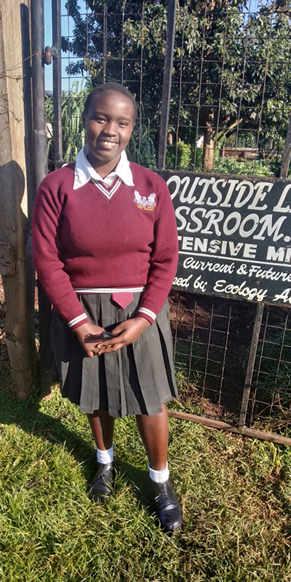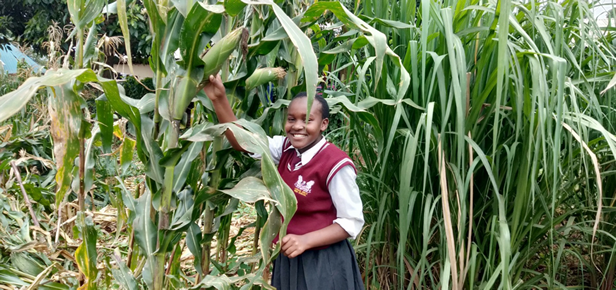A Girl's GB Education in Kenya This article was sent by Joshua Machinga, GB educator and Director of Manor House Agricultural Center (MHAC) in Kenya and written by one of their students, a girl who has been inspired to change her life,
I was born and raised in Nairobi, the capital city of Kenya, the first born in a family of three. My father was an electrician and my mother a hairdresser. Both had only basic education, but wanted more for us. I was a very good student, an over-achiever, but my hopes and dreams were crushed when my father died. For a time, I thought I would never achieve anything, and all hope was lost. In Kenya, you must pay fees to go to secondary school, plus internal exam fees, plus the cost of a school uniform, exercise books, pens… My parents couldn't afford to keep me in school, so my siblings and I struggled. It is “normal” for a 15-year-old to get married, and many believe the highest achievement of a woman is marriage. I had no options, but I had a clear plan for my future. Yet when I was twelve, that future looked bleak. A year after my father died, my mother heard of Lenana Girls High School, and she struggled to get me in. This was a chance for me to be educated, and I took it more seriously than ever. Lenana not only provides for my education; they also make sure I have a safety net through the mentoring. I have a bigger vision now, and am committed to my dream to help better the community. I share everything that I learn each day with people back home. I have made a formal plan of how I will contribute to the community though empowerment and sustainable practices training. When people are
well informed, they make wise decisions in their lives, and subsequently reduce the strain of climate change on the environment. At school we are learning GROW BIOINTENSIVE Mini-Farming, techniques good for our environment. Each day we are faced with changing weather patterns and we find ourselves with fewer and fewer harvests at the end of each farming season. The global phenomenon of the El Niño and La Niña have been affecting the farmers in extremely disturbing ways. In 2016/2017 there were serious floods, and this year, a terrible drought affected our farmers, both resulting in lower harvests. That will change once the people are well informed and trained on the tactics to counter climate change, and how to practice agriculture that is climate smart. I have also been very concerned about the issues of deforestation, and land contamination with plastics and all types of residues. This has led to the increase of greenhouse gas emissions, increasing the effects of climate change—but most of the polluting products can be reused and recycled as raw materials in other processes. What I am proposing will be a lifetime project that will invest in the reduction of deforestation and an increased use of alternative energy, starting from my backyard through every corner of the country; we can improve and reduce these effects faster and more effectively. The core of the project will focus on the use of available resources in farming, and the closing of nutrient cycles. I will emphasize good use of animal and vegetable waste on the farms. I will encourage investment in solar water pumps and other equipment to help lessen the effects of drought during dry times. The water table in many areas is not very far from the surface, hence it will be easy to irrigate with manual pumps when the need arises. The climate-smart techniques such as GROW BIOINTENSIVE I want to invest in involve increasing tree cover. While the trees hold the soil together and capture the greenhouse gases, normal agricultural production takes place alongside them. I will be focusing on training more youths in these practices, since they are advocates of change who will engage their communities.
Although currently I am a student at Lenana Girls High School and I will be taking my final year of high school this year, I have not lost contact with my people back home. I still take time to send messages to my village to hopefully inspire other girls to work hard and help break the vicious cycle of poverty. I am determined to get back and give back to the community and country that is helping me get to where I am today. During my vacations I visit communities in my county and beyond to motivate and share my story with other girls, so that they know and learn that it is possible to be who we want to be, even from disadvantaged and marginalized backgrounds. I believe having access to education makes girls and women better decision makers, and reduces the number of children that they have, reducing the pressure on the limited resources available, and therefore reducing the effects of climate change. Having access to education also means girls will be more open-minded to change, and will accept change faster, hence the implementation of measures on climate change will be easier and more accepted. I do know, because I am living proof, that education is the center of all. Thank you for helping me!
top | Newsletter Home |Table of Contents| Archive
|


 Right now, humans are cutting off the branch they are sitting on. July 29, 2019, was Earth Overshoot Day: the day we no longer have resources to support us sustainably; what we consume or exploit for the rest of the year comes at the expense of our planet. Replacing those resources takes more time than we have, since the population is continuously growing, and resources are fewer each year. I have made it my mission to help reverse this trend: to move Overshoot Day forward. I know how, because I am living proof that it all starts with girls’ education. Because I’m educated, I will have a small, healthy family in the future, and right now I am bringing the knowledge and skills my community needs to cope with resource limitations and climate change.
Right now, humans are cutting off the branch they are sitting on. July 29, 2019, was Earth Overshoot Day: the day we no longer have resources to support us sustainably; what we consume or exploit for the rest of the year comes at the expense of our planet. Replacing those resources takes more time than we have, since the population is continuously growing, and resources are fewer each year. I have made it my mission to help reverse this trend: to move Overshoot Day forward. I know how, because I am living proof that it all starts with girls’ education. Because I’m educated, I will have a small, healthy family in the future, and right now I am bringing the knowledge and skills my community needs to cope with resource limitations and climate change.

